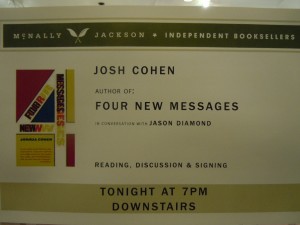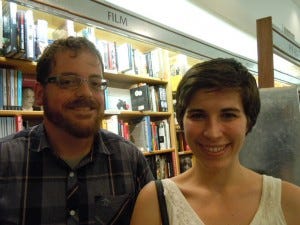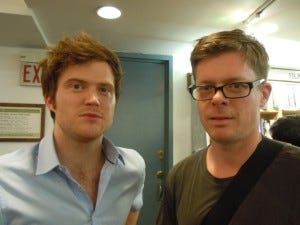news
The Meta is Built Into It: Joshua Cohen’s “Four New Messages”

1. The sign on McNally Jackson’s door. Cohen remarked that the cover of his new book was an interpretation if “Mondrian had designed a parking garage.” Don’t forget Level 4, guys.

How to recap a reading for a book that explores the internet as a prevalent “experience of engagement” — an essential component of literature — that allows the user to “vicariously experience someone’s vicarious experience”? Before you stop reading, there was also a lot of sex for the last public reading of Joshua Cohen’s new book, Four New Messages, in McNally Jackson’s basement, and it didn’t get all that meta. Vol. 1 Brooklyn Founding Editor Jason Diamond was on deck to help keep things real, talking with Cohen not only about internet pornography, but also post-’89 communism, New Jersey, typo-induced neurosis, and huge Jewish books.
1. Jason Diamond and Joshua Cohen, talking shtetls and personal exorcism in the interwebs. 2. Vol. 1 Brooklyn Managing Editor and Robert Goulet enthusiast Tobias Carroll with Jen Vafidis, Vol. 1 Brooklyn Deputy Editor and cool person.


Cohen started reading shortly after 7, taking a quick look at the sizeable audience before announcing “looks like the only person who’ll enjoy this is me,” and poking fun at the several readings of his new book he’s done the last month. ‘Sent’, a story “set at the fall of the Eastern Bloc and the rise of the internet,” follows the rise and demise of one Mary Mor, aka Tiny Toyta, aka Toyta, an innocent, barely-18 girl from the defunct Eastern Bloc. The narrator describes the amateur porn industry as “a movie of constant orgasm… a collectivist biopic,” and its cast as “the aspiring stars of their own lives.” Mor’s acting peak — after several pornographic features — is a role in a movie called ‘Sleepwalker #5’ as Hottie #3 (a speaking role, screen time less than 45 seconds), thanks to a “Russian-Floridian-Israeli” producer she met in a bar/brothel. Only misfortune ensues for Toyta, whose dreams of making it America are prevented by one infectious disease common in America: “doubt.” If this is the kind of havoc befallen onto Eastern Europe post-Cold War from the internet, I’m scared to know what’s been wreaked upon comparatively comfy American keyboards and screens.
1. Elias Altman, an Editor at Lapham’s Quarterly, with Michael Miller, Editor at Bookforum. 2. Jason Rice, one third of Three Guys, One Book, and Gabrielle Gantz, Senior Publicist at Picador, Book Borougher, and punctuation mark tattoo enthusiast.


Diamond’s first question for Cohen was why he chose to have a spare internet presence, but write about the internet in an engaged, fictional space. “My relationship with the internet is an anxiety,” Cohen said, the same anxiety he has for public presentation. As an example, Cohen relayed to us a story about how he once added a comma to a three-year-old Facebook comment, and his subsequent exit from the social network. Most of Diamond’s and Cohen’s conversation ended up revolving around Cohen’s fascination with internet pornography, which has its origins in a job Cohen held in Berlin translating the back copy of Russian porn DVDs. And of course, his past life of being a male college student. Diamond thought that Cohen had “gone away from the shtetls,” terrain Cohen has traversed in his previous works, including the massive tome Witz. That work was “one more wet-eyed, potato-gnawed nostalgia for that culture,” Cohen said. Cohen will go further away from the menschen and unmenschen in his forthcoming nonfiction book, which is a history of attention, starting “from Egyptian antiquity all the way to computers.” He’s also co-programming a computer program that mimics the effects of meth by overclocking the computer’s CPU. Um. Fuck yeah.
During the Q&A, Cohen was asked about his proclivity for New Jersey. Besides growing up there, it is “the most non-neglected neglected place in America,” and his stories set there were a way to “parody” the state and “get it out of his system.” He then went into a brief examination of what it means to be from “central Jersey” versus “south Jersey,” which boils down to socioeconomic judgments from one region onto the other. Earlier in the discussion, Cohen noted that the internet had “meta built into it,” and one curious audience member asked if now, with social networking a pervasively strong force in the internet, the meta had disappeared, if it’d been replaced by something else. “It’s been replaced by boredom,” Cohen replied promptly. Four New Messages does everything but bore the reader, and is helping make the internet a more real thing.
***
— Ryan Chang is Events Editor for The Outlet. His work has appeared in Vol. 1 Brooklyn, Art Faccia, and elsewhere. He tweets here, and tumbles for you here.









